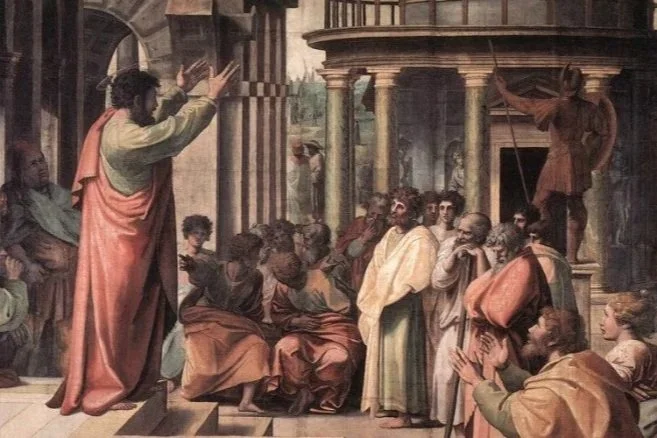We’re All Debtors, Matthew 18:23-34
This parable is about forgiving a repentant brother or sister who has offended us (vv. 15-17) and illustrates Jesus’ teaching on unlimited forgiveness, prompted by Peter’s question in vv. 21-22. “The kingdom of heaven,” Jesus said, “is like a king who wanted to settle accounts with his servants” (v. 23, NIV). A first debtor came to his lord. He owed him 10,000 talents, an astronomical sum equivalent to several million dollars. Since he could not pay, the lord/king ordered him to be sold, along with his wife, children, and everything he had, in order to secure at least part of the debt. The man fell on his knees before the lord and begged him to be patient with him, promising to pay “everything.” The lord had compassion on the servant, forgave him the whole debt, and set him free (v. 27).
When the man left the king's presence, he ran into a fellow servant who owed him a hundred denarii, equivalent to a few hundred dollars. Taking him by the neck, he demanded that he pay him what he owed. His fellow servant begged him, saying, “Be patient with me, and I will pay you back” (v. 29). But he had no mercy and had him thrown into prison until he paid the debt (v. 30). Other servants saw what had happened and told their lord about it. He called for the unmerciful servant and said to him:
“You wicked servant! … I canceled all that debt of yours because you begged me to. Shouldn’t you have had mercy on your fellow servant, just as I had on you?” In anger, his master handed him over to the jailers to be tortured, until he should pay back all he owed. (vv. 32-34)
Jesus makes an application in v.35: “This is how my heavenly father will treat each of you unless you forgive your brother or sister from your heart.”
The theme of forgiveness had been introduced in the model prayer in Matthew 6:12: “And forgive us our debts as we also have forgiven our debtors.” Likewise, Matthew 6:14-15 says, “For if you forgive other people when they sin against you, your heavenly Father will also forgive you. But if you do not forgive others their sins, your Father will not forgive your sins.”
Jesus’ reasoning is that if someone has been forgiven by God, he is ipso facto obligated to forgive his brother or sister. Otherwise, God will revoke His forgiveness. That’s a very strong warning indeed, and yet it does not make the obligation to forgive those who offend us any easier. My first reaction towards someone who offends me is to take revenge, not to forgive— especially if the offense is serious or repeated. But when I consider what God has forgiven me—things I dare not even mention… when I reflect on the countless times He has done it—even when I fell back into the same sin over and over again… when I remember how some of my conduct brought shame to Christ and emotional pain to my brothers and sisters… I understand the unpayable nature of my debt toward God, and I’m prompted to forgive.
The extravagance of the character of forgiveness among members of the community of faith is thus based on the nature of God’s forgiveness, as communicated in v. 33: “Shouldn’t you have had mercy on your fellow servant, just as I had on you?” So, not acting the way God has acted with us makes us a “dulé poneré” (a wicked servant, v. 32), and the inability to forgive someone who is repentant calls into question the sincerity of a person's discipleship.
It is important to keep in mind that forgiving a person does not imply justifying what he or she did to us, nor that we are obligated to trust him/her or befriend him/her again. It simply means that we decide to leave the offense in God’s hands. In doing so we can have peace of mind and move forward. The pain will still be there; healing will not be automatic, but it will happen in God’s timing.







